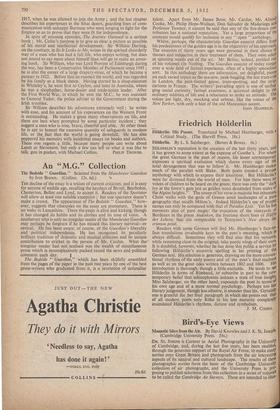Friedrich Holderlin
Holderlin: His Poems. Translated by Michael Hamburger, with s Critical Study. (The Harvill Press. 18s.) Holderlin. By L. S. Salzberger. (Bowes & Bowes. 6s.) HoLDERLIN 'S reputation is the creation of the last thirty years, and it has grown to some extent at the expense of Goethe's. For where the great German is the poet of reason, his lesser contemporad expresses a spiritual exaltation which shows every sign of the total derangement that was to follow it. Mr. Hamburger makes much of the parallel with Blake. Both poets created a private' mythology with which to express their intuitions. But Holderlin's were far divorced from the world of men. For him there were 11° voices of children to be heard on the green; there was only the "dark ivy at the forest's gate just as golden noon descknded from stairs of the Alpine heights." The sweep of his verse is majestic but inhuman; Christ walks with the gods of Greece amid landscapes of a par° geography that recalls Milton's. Indeed Holderlin's use of proper names can only be compared with that of Paradise Lost. Yet he W1. moments also of pure magic: the evocation of the vineyards OL Bordeaux in the poem Andenken, the fourteen short lines of HOP des Lebens, that are comparable to TennysOn's Now sleeps 1118 crimson petal. Readers with some German will find Mr. Hamburger's face-to' face translations invaluable keys to the poet's meaning, which i5 always difficult. Sometimes they will find also that his versions, while remaining close to the original, take poetic wings of their °WTI' It is doubtful, however, whether he has done this public a service bY following Hiilderlin's eccentric spelling in his printing of the German text. His selection is generous, drawing on the more convea' tional rhythms of the early poetry and of the poet's final madnes5 as well as on the great odes written between 1802 and 1806. His introduction is thorough, though a little excitable. He tends to see Holderlin in terms of Rimbaud, to' subscribe in part to the con' temporary belief that schizophrenia induces a state of true insight' Miss Salzberger, on the other hand, expounds the poet in termS- of his own age and of a more normal psychology. Perhaps too her literary judgement, though less allusive, is sounder than his. CertainlY, one is grateful for her final paragraph in which she points out tha' of all modern poets only Rilke in his late maturity completelY assimilated Holderlin's rhythms, diction and symbolism.
J. M. COHEN.


















































 Previous page
Previous page